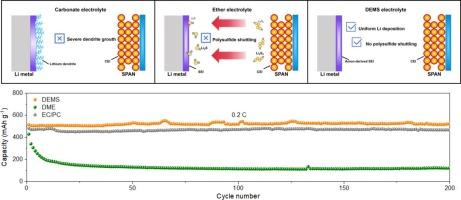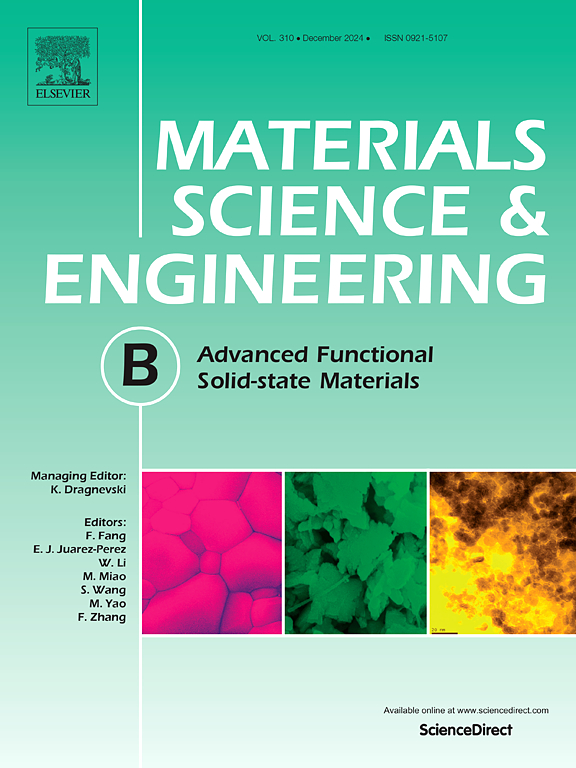为高性能锂硫电池量身定制环保型硅氧烷基电解质
IF 3.9
3区 材料科学
Q2 MATERIALS SCIENCE, MULTIDISCIPLINARY
引用次数: 0
摘要
锂硫电池(LSB)具有超高的理论能量密度(2600 Wh kg-1),被认为是最具吸引力的高能电池之一。然而,多硫化物的 "穿梭效应 "和锂(Li)枝晶的不可控生长给 LSB 的实际应用带来了巨大挑战。在此,我们选择了一种轻质、环保的二乙氧基二甲基硅烷(DEMS)作为 LSB 的多功能溶剂。DEMS 的极性低,可在充放电过程中促进硫化聚丙烯腈(SPAN)的 "固-固 "转换,消除多硫化物的穿梭效应。此外,基于 DEMS 的电解质还能在 -20 至 60 °C 的宽温度范围内实现高度可逆的锂镀层/剥离过程。因此,使用 DEMS 电解质的锂/SPAN 电池在 0.2 C 下表现出卓越的循环稳定性,在 26、60 和 -20 °C 下循环 200 次后的可保持容量分别为 524.4 mAh/g、598.8 mAh/g、318.6 mAh/g。本研究旨在通过溶剂筛选确定低成本、高稳定性的电解质,以提高 LSB 的电化学性能。本文章由计算机程序翻译,如有差异,请以英文原文为准。

Tailoring eco-friendly siloxane-based electrolytes for high-performance lithium–sulfur batteries
Lithium–sulfur batteries (LSBs), with their ultra-high theoretical energy density (2600 Wh kg−1), are considered one of the most attractive high-energy batteries. However, the “shuttling effect” of polysulfides and the uncontrolled growth of lithium (Li) dendrites pose significant challenges to the practical implementation of LSBs. Herein, a lightweight and eco-friendly diethoxydimethylsilane (DEMS) is chosen as a multi-functional solvent for LSBs. The low polarity of DEMS promotes the “solid–solid” conversion of sulfurized polyacrylonitrile (SPAN) during charge–discharge processes, eliminating the shuttle effect of polysulfides. Moreover, the DEMS-based electrolyte enables highly reversible Li plating/stripping processes across a wide temperature range spanning from −20 to 60 °C. As a result, the Li/SPAN batteries using the DEMS electrolyte exhibit excellent cyclic stability at 0.2 C with retainable capacities of 524.4 mAh/g after 200 cycles, 598.8 mAh/g after 100 cycles, and 318.6 mAh/g after 50 cycles at 26, 60 and −20 °C, respectively. This study aims to identify low-cost and highly stable electrolytes through solvent screening to enhance the electrochemical performance of LSBs.
求助全文
通过发布文献求助,成功后即可免费获取论文全文。
去求助
来源期刊

Materials Science and Engineering: B
工程技术-材料科学:综合
CiteScore
5.60
自引率
2.80%
发文量
481
审稿时长
3.5 months
期刊介绍:
The journal provides an international medium for the publication of theoretical and experimental studies and reviews related to the electronic, electrochemical, ionic, magnetic, optical, and biosensing properties of solid state materials in bulk, thin film and particulate forms. Papers dealing with synthesis, processing, characterization, structure, physical properties and computational aspects of nano-crystalline, crystalline, amorphous and glassy forms of ceramics, semiconductors, layered insertion compounds, low-dimensional compounds and systems, fast-ion conductors, polymers and dielectrics are viewed as suitable for publication. Articles focused on nano-structured aspects of these advanced solid-state materials will also be considered suitable.
 求助内容:
求助内容: 应助结果提醒方式:
应助结果提醒方式:


